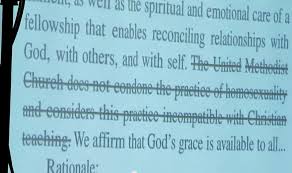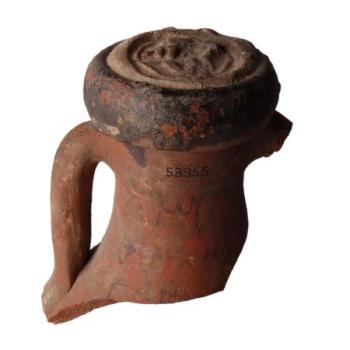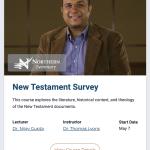One of the recurrent suggestions about how to resolve the impasse in the United Methodist Church, which is now getting a great deal of consideration as something to be proposed to the General Conference in 2016 is the two jurisdiction proposal. This particular post will not deal with some of the merits of the proposal (yes there are some), but with the serious flaws in any such proposal.
POINT ONE: Two jurisdictions will of course require two different Disciplines, not only on the presenting issue of gay marriage and gay ordination, but on a whole host of related issues, including ones that have not been carefully thought through, because they have not surfaced yet. Whenever you change a massive structure, there are always unintended consequences. The most important practical point is this proposal absolutely destroys the connectional system which is one of the distinctive and most important features of our church. Then too, two jurisdictions with two Disciplines will require, necessarily two Judicial Councils since there will be two sets of church laws for the two jurisdictions.
POINT TWO: I have neither seen nor heard any proposal along this line that doesn’t also likely lead to two very different councils of bishops. By this I mean you will have some bishops who are prepared to serve in only one or another of the jurisdictions. Suppose then you have the larger jurisdiction (in terms of numbers of churches and members) with a much smaller number of bishops. Shall we then abandon the current annual and jurisdictional conference structure, and combine a bunch of conferences into some uber-conferences to deal with our annual business? And in most of these problems, this so-called solution simply means that the annual conferences, if they continue to exist, will continue to have wrangling over the presenting issues. The problem has been shifted away from a once every four years debate, to every year in every area!
POINT THREE: Frankly, this proposal completely undermines the annual conference structures which are necessarily regional. It is the Annual Conferences that really sort out local issues year by year. Shall we just abandon annual conferences as well? But to do that means also abandoning local accountability. Churches are all necessarily local, and require local district superintendents and local bishops to deal with local problems. If you have say, five churches in Oregon that are part of a more traditional jurisdiction, but there is no bishop anywhere near resident, there is a problem. This undermines the local and regional nature of the connectional system as it now exists. Besides, there is also the ‘held in trust’ rule when it comes to property. This would need to be drastically changed.
POINT FOUR: In any given local church there are almost always people who have differing opinions about our presenting issues. What then? Are we prepared to facilitate a massive case of ‘sheep shift’ so people can worship in a church where they think Biblical and Wesleyan principles are best honored? And what if in a specific local area there is no such church? It has often been said that all politics are local, but so is church membership, church life etc. This whole proposed change will be a systemic change that undermines much of the very best aspects of our whole current system with bishops and annual conferences and jurisdictional conferences and then finally a periodic general conference.
POINT FIVE: It requires money to support boards and agencies, not to mention colleges and seminaries. When you divide the money into two piles, some agencies and some schools which choose to go with one particular jurisdiction rather than the other will find their support has mostly dried up, not least because some Methodists will be disgusted with this whole resolution of the matter, and refuse to support our church any more. And if instead money is shared between the two jurisdictions, there will have to be new accountability structures, so that the money spent in both jurisdictions goes towards things both jurisdictions agree on!
POINT SIX: This ‘solution’ really creates two churches which share a few things in common, but not a connectional structure. Surely, it would be much easier and better to simply allow those who can no longer abide by our current discipline to leave, taking their pensions (if they are ministers), and some church property with them if a church wants to leave. The same would apply to our other structures and institutions. Those who are agitating for this two jurisdiction solution should realize that the freedom and independence being sought on sexual ethics matters is much more easily achieved by simply starting the Progressive Methodist Church and letting those who want to leave, leave. The analogy with the split over slavery in the 19th century should teach us at least this—- there really were two separate churches when there was the ME Church South and the ME Church North, each with their own set of structures. If there are de facto two churches, this requires the honesty of de jure two churches eventually or else things become completely dysfunctional.
And as for the conservative proposal that the traditionalists and evangelicals should leave and start a new Methodist Church, I am not at all sanguine that those leaving would want to stick together and begin anew. Evangelicals tend to be very independent minded, and if presented with an opportunity to go somewhere with less hierarchy, less accountability, less causes that raises issues of conscience, I would bet many such ministers and lay people would rather not invest the huge energy and time and money required to start anew. Why not just walk down the street, or in the case of ministers, transfer one’s credentials in another denomination, and carry on? This might provide an unexpected boon to a church such as the Free Methodists, but it does not appear that it has crossed the minds of enough people that Exodus follows Genesis, not the other way around.
Whatever we may think about any or all of these points, and even if I am wrong about a good deal of this, I don’t need to be right about all of it for the following to be inevitable—- just as in the case of the Episcopal Church, and in some Christian Churches, and some Lutheran Churches, and some Presbyterian Churches, and some Baptist Churches this whole move will result in loss of membership. It will not stop the current bleeding, it will accelerate it. Just take a look at the before and after stats for these other mainline churches.
If we want to further diminish the integrity and influence of our church in our American society, then this is a good way to assure that will happen. The old saying ‘in essentials unity, in non-essentials diversity’ is a good dictum, as long as we agree on what the essentials are when it comes to something as fundamental as ordination or the nature Christian marriage which is supposed to be holy matrimony. But alas we don’t agree on these vital things. We cannot have a ‘United Methodist Church’ if we don’t at least agree on the most basic theological and ethical essentials which are currently enshrined in our Discipline— both the doctrines enshrined in our Discipline and the ethics as well. Short of that, we should quietly agree to become two different Methodist Churches.
Of course any such major change as a reorganization into two jurisdictions requires a two thirds vote at the General Conference. I can’t see such a two jurisdiction solution getting to that number of votes. Quo Vadis then UMC? My suggestion is that those who cannot in good conscience abide by the Discipline as we have it, and John Wesley’s teachings on celibacy as we have it, and the Bible’s teachings on sexual ethics and marriage (see Mt. 19 where the latter is defined quite clearly as heterosexual monogamy) should be brave and start a new venture, the Progressive Methodist Church. Those prepared to continue to abide by our doctrines and disciplines should simply stay and go forward.



















